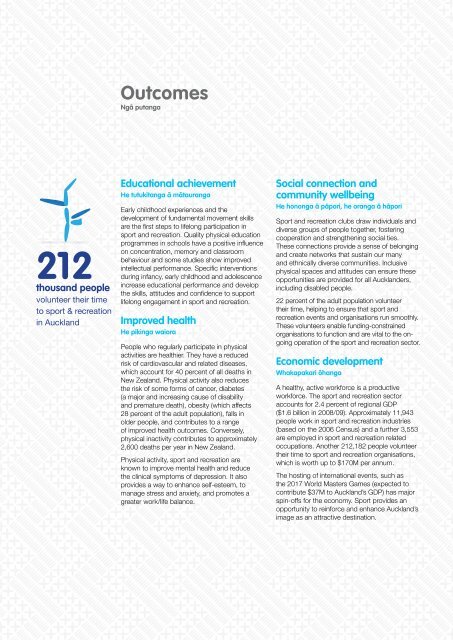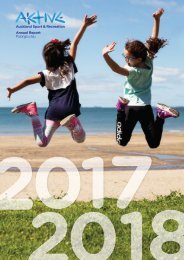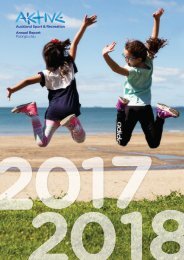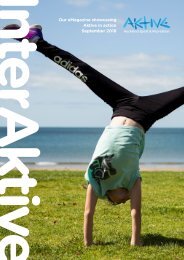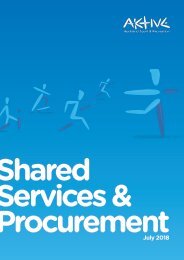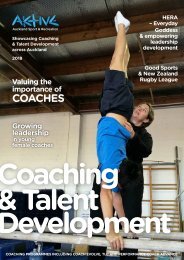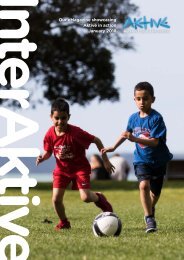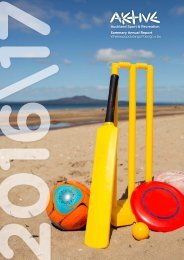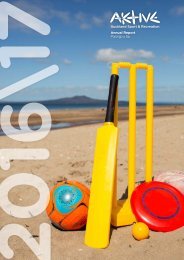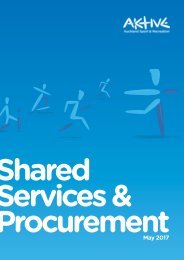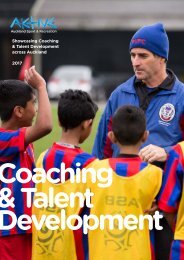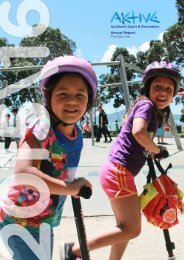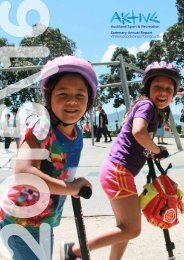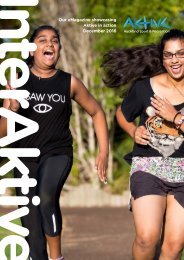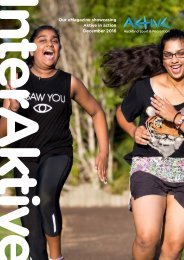Aktive Strategic Plan 2014
You also want an ePaper? Increase the reach of your titles
YUMPU automatically turns print PDFs into web optimized ePapers that Google loves.
Outcomes<br />
Ngä putanga<br />
212<br />
thousand people<br />
volunteer their time<br />
to sport & recreation<br />
in Auckland<br />
Educational achievement<br />
He tutukitanga ä mätauranga<br />
Early childhood experiences and the<br />
development of fundamental movement skills<br />
are the first steps to lifelong participation in<br />
sport and recreation. Quality physical education<br />
programmes in schools have a positive influence<br />
on concentration, memory and classroom<br />
behaviour and some studies show improved<br />
intellectual performance. Specific interventions<br />
during infancy, early childhood and adolescence<br />
increase educational performance and develop<br />
the skills, attitudes and confidence to support<br />
lifelong engagement in sport and recreation.<br />
Improved health<br />
He pikinga waiora<br />
People who regularly participate in physical<br />
activities are healthier. They have a reduced<br />
risk of cardiovascular and related diseases,<br />
which account for 40 percent of all deaths in<br />
New Zealand. Physical activity also reduces<br />
the risk of some forms of cancer, diabetes<br />
(a major and increasing cause of disability<br />
and premature death), obesity (which affects<br />
28 percent of the adult population), falls in<br />
older people, and contributes to a range<br />
of improved health outcomes. Conversely,<br />
physical inactivity contributes to approximately<br />
2,600 deaths per year in New Zealand.<br />
Physical activity, sport and recreation are<br />
known to improve mental health and reduce<br />
the clinical symptoms of depression. It also<br />
provides a way to enhance self-esteem, to<br />
manage stress and anxiety, and promotes a<br />
greater work/life balance.<br />
Social connection and<br />
community wellbeing<br />
He hononga ä päpori, he oranga ä häpori<br />
Sport and recreation clubs draw individuals and<br />
diverse groups of people together, fostering<br />
cooperation and strengthening social ties.<br />
These connections provide a sense of belonging<br />
and create networks that sustain our many<br />
and ethnically diverse communities. Inclusive<br />
physical spaces and attitudes can ensure these<br />
opportunities are provided for all Aucklanders,<br />
including disabled people.<br />
22 percent of the adult population volunteer<br />
their time, helping to ensure that sport and<br />
recreation events and organisations run smoothly.<br />
These volunteers enable funding-constrained<br />
organisations to function and are vital to the ongoing<br />
operation of the sport and recreation sector.<br />
Economic development<br />
Whakapakari öhanga<br />
A healthy, active workforce is a productive<br />
workforce. The sport and recreation sector<br />
accounts for 2.4 percent of regional GDP<br />
($1.6 billion in 2008/09). Approximately 11,943<br />
people work in sport and recreation industries<br />
(based on the 2006 Census) and a further 3,553<br />
are employed in sport and recreation related<br />
occupations. Another 212,182 people volunteer<br />
their time to sport and recreation organisations,<br />
which is worth up to $170M per annum.<br />
The hosting of international events, such as<br />
the 2017 World Masters Games (expected to<br />
contribute $37M to Auckland’s GDP) has major<br />
spin-offs for the economy. Sport provides an<br />
opportunity to reinforce and enhance Auckland’s<br />
image as an attractive destination.


